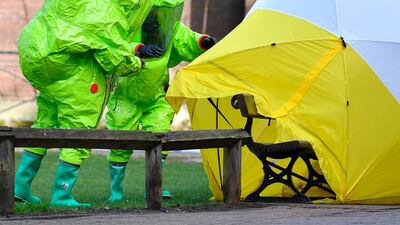British officials were told to “drain the swamp” of Russian agents operating in the country, starting with Moscow’s ambassador, as the investigation into the poisoning of a former spy and his daughter widened to suspicious deaths of other members of his immediate family.
Sergei Skripal, 66, and his daughter Yulia Skripal, 33, remain in a coma in a hospital in southern England after chemical weapons experts determined that a nerve agent had been used to try to kill them.
The Russian double agent and his daughter were found critically ill on a public bench, and a policeman who attended the scene is also in hospital.
The attack has aroused suspicions of state-orchestrated revenge by the regime of Vladimir Putin and revived anger over a long list of other Russia-linked murders in the country.
Sir Christopher Meyer, a former British ambassador to Washington, said that if blame for the incident could be attributed to the Kremlin then London must be seen to act very forcefully. The expulsion of the Russian ambassador Alexander Yakovenko and known or suspected agents was an obvious first step despite the risks bilateral ties could go into a “deep freeze”.
“You cannot tolerate a government assassination on British soil – it is absolutely beyond the pale and needs a reaction,” he said. “You could not only expel the ambassador but drain the swamp of all these guys that MI5 are tracking around London or wherever.”
Known as the spy with the Louis Vuitton bag, Mr Skripal was a KGB veteran who was convicted in Russia for spying for the British intelligence agency MI6. He was handed over as part of a spy swap in 2010 and was living quietly in the garrison town of Salisbury, south-west of London.
Police cordoned off the graves of his wife and son, who died since his move to England, suggesting that the bodies could be disinterred for examination. Those deaths plus the unexpected demise of one of his brothers in Russia have led to reports that the whole family was targeted by the Kremlin for attack.
There are also suggestions that Mr Skripal maintained contacts with the world of intelligence, in particular through private intelligence firms, including the one linked to the notorious Trump dossier.
One source told the Daily Telegraph Mr Skripal was seen meeting with a consultant who worked for the firm Orbis Business Intelligence, cofounded by Christopher Steele. The former head of the MI6 Russia desk, Mr Steele compiled the 17-chapter, sometimes salacious, account of Donald Trump's links to Moscow. There was no response to the report from the firm, which operates in central London.
Adding to the intrigue, another former Russian agent exiled in the UK, Valery Morozov, claimed that Mr Skripal had maintained ties with Russian intelligence and visited the Russian embassy in London "every month”. The Russian embassy in London denied any contact between Mr Skripal and its staff and on Twitter described him as a “British spy”.
_______________
Read more:
UK warns of Russia reprisals as ‘poisoned’ spy fights for life in hospital
Deaths in Britain from suspected poisoning
_______________
The Home Secretary Amber Rudd faced furious questions in parliament as she updated MPs on the “very rare substance” used in the attack.
"The use of a nerve agent on UK soil is a brazen and reckless act. This was attempted murder in the most cruel and public way. People are right to want to know who to hold to account,” she said. “But if we are to be rigorous in this investigation, we must avoid speculation and allow the police to carry on their investigation.
"We are committed to doing all we can to bring the perpetrators to justice, whoever they are and wherever they may be.”
Assistant Commissioner Mark Rowley, the UK’s most senior counter-terrorism official, has said the attack was being treated as deliberate. “I can also confirm we believe the two people were targeted specifically," he said. "Our role now is of course to establish who is behind this and why they carried out this attack.”
Tom Tugendhat, the Conservative chairman of the Foreign Affairs Select Committee, said the parallels with the use of the radioactive substance polonium to kill Alexander Litvinenko in 2006 were too powerful to ignore.
“I think it is unlikely we will ever have 100 per cent proof, but this will build up towards a pattern where it makes any other answer extremely unlikely,” he said.
“We see threats in 2010 made by President Putin himself on Russian television, we then see a modus operandi that looks remarkably similar to the murder of Litvinenko and the attempted murder of the Montenegro prime minister and indeed others around Europe. We are beginning to see not only a very strong pattern, but also a very strong centre to that pattern and that centre appears very strongly to be the Kremlin.”

